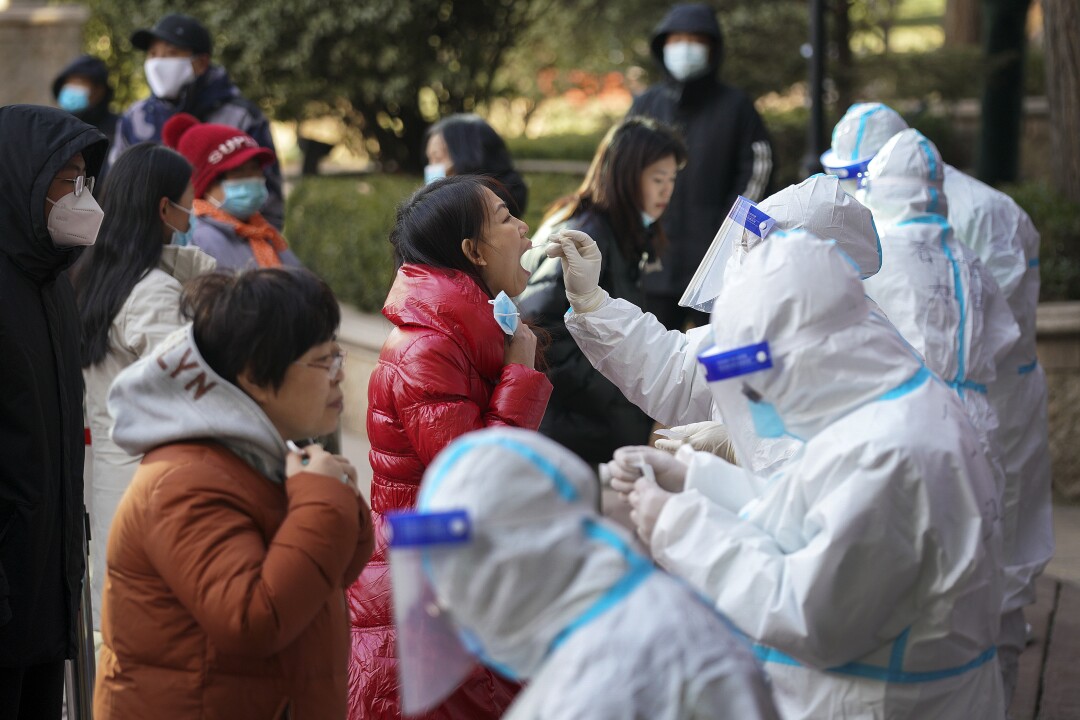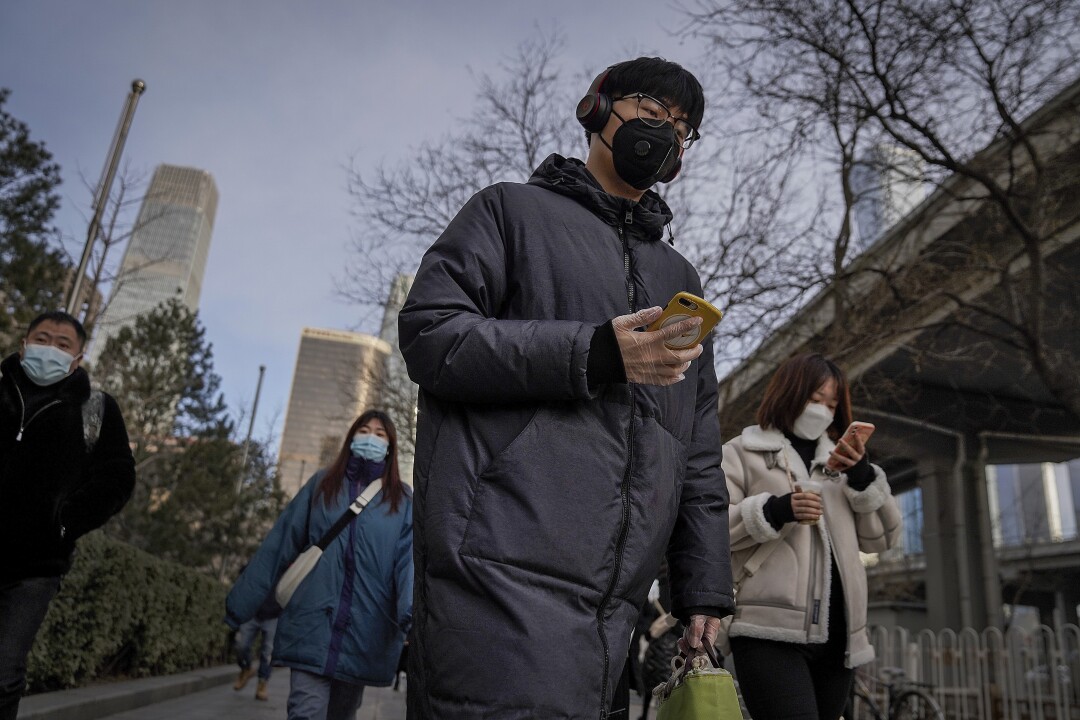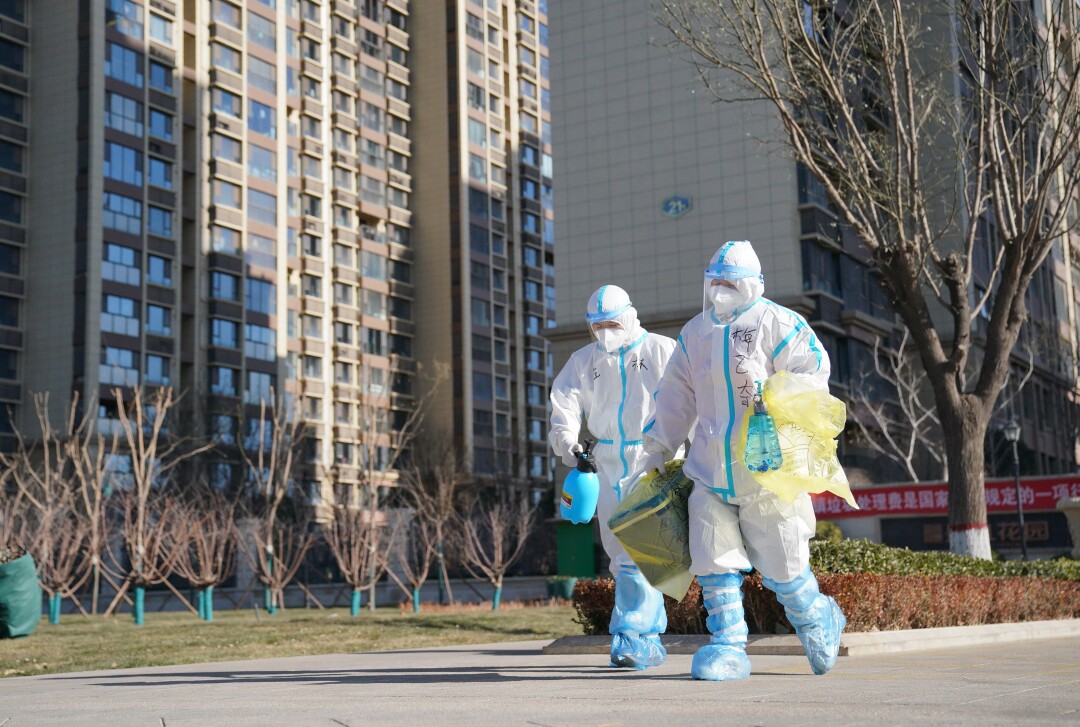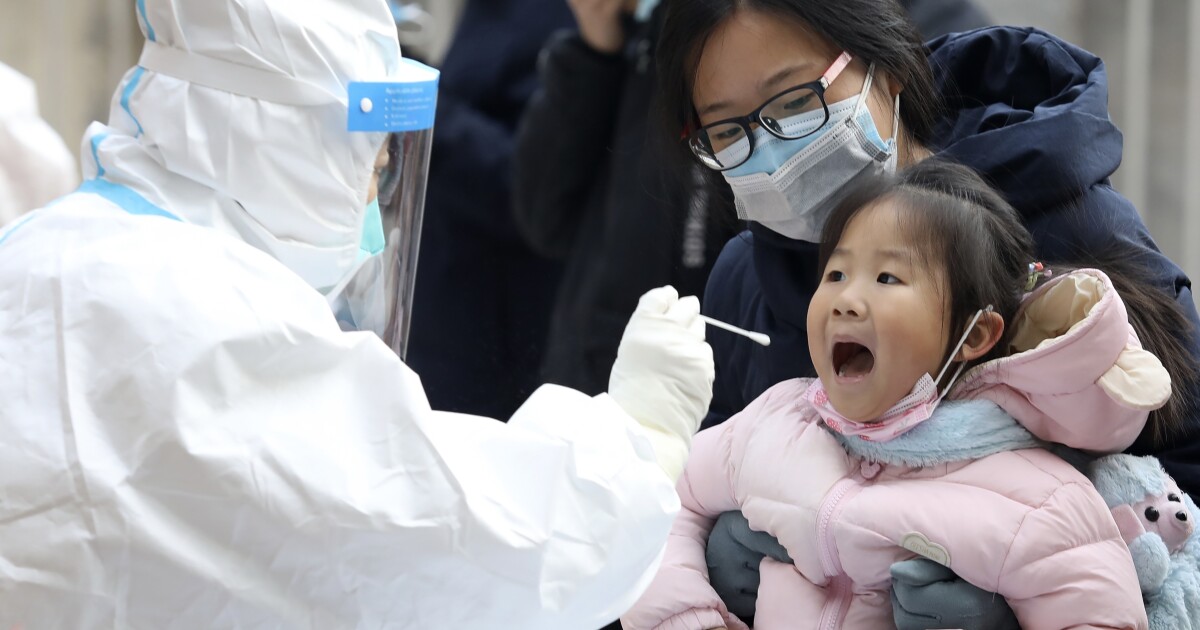Zhao Renmi woke up to the sound of village officials shouting that everyone had to pack and leave, with no explanation of where or for how long. The news of a new outbreak of COVID-19 was spreading, so she gathered her children and obeyed.
“My heart is really troubled. It’s hard to bear, ”said Zhao, a woman with short hair who lives in rural Hebei, in a video posted this week on Douyin, the Chinese version of TikTok. She was one of about 20,000 residents who were evacuated from 12 nearby villages, according to local reports and health officials, as part of China’s crackdown on the biggest coronavirus outbreak in months.
More than 500 new cases have been found since January 2 in Hebei, the industrial province around Beijing, generating a “wartime” response from Chinese officials fearful of the virus’s spread before the Spring Festival, when hundreds of millions of Chinese cross the country to return home each year.

A medical worker in a protective suit examines a resident for the coronavirus in Shijiazhuang, China, on January 6, 2021.
(Wang Xiao / Xinhua News Agency)
The increase in infections comes when a World Health Organization mission that investigates the origins of the pandemic is due to arrive on Thursday. An embarrassing flaw occurred last week, when Beijing announced on the day that several team members had already started their travels to China that their visas had not been approved, causing a delay – and frustration by WHO Director-General Tedros Adhanom Ghebreyesus.
China has been sensitive to criticism from the United States and other countries that it has not done enough to prevent the virus from spreading beyond its borders a year ago. It is not clear what kind of access the WHO team will have to assess the genesis of the pandemic. Most medical experts believe it was transmitted by an animal at a food market in Wuhan, but others suggest it may have originated in a laboratory.
Dr. Dale Fisher, a Singapore-based infectious disease specialist and a member of a previous WHO mission to China, told Reuters on Tuesday that expectations were “very low” that the medical team would come out with meaningful responses.
Some 18 million residents of Hebei’s capital, Shijiazhuang, and the neighboring city of Xingtai have been banned from leaving, with public transport disrupted, mass tests in progress and requests to stay at home under the strictest block since Wuhan was kidnapped in early 2020.
In rural areas around Shijiazhuang, where many of the cases from the most recent outbreak were found, residents were evacuated. In Douyin, users posted videos of villagers wrapped in winter jackets with suitcases, plastic bags and children in tow, lining up to board red buses going to quarantine.

Residents in Shijiazhuang, China, are tested for coronavirus on January 6, 2021.
(Mu Yu / Xinhua News Agency)
Zhao turned his camera to show a full backpack, two bags of fertilizer full of clothes and things for his children and steamed breads to eat on the way. “I dont understand. I feel like a refugee, ”she said. “But I think that we obey the dispositions of the nation. If they want us to move, we move. “
This acceptance of government orders helped China to contain the pandemic and restart its economy far ahead of much of the world. Despite accusations that authorities underestimated cases and mismanaged last year’s initial outbreak, the state’s broad restrictions and granular control have since kept the total case count below 98,000, with 4,793 deaths, as reported by Johns University Hopkins.
No one died in the recent outbreak, and similar “war mode” reactions to small outbreaks by 2020 quickly controlled the virus and allowed for a quick return to work, school, travel and social gatherings.
However, this same insistence on control obstructed research on the origins of the pandemic and silenced Chinese voices that challenge the government’s positive narrative. In late December, a former lawyer named Zhang Zhan was sentenced to four years in prison for recording videos in Wuhan of overcrowded hospitals, fearful residents and his own questions about government crackdown on whistleblowers.
Zhang is one of at least four Chinese videobloggers, including another lawyer and former CCTV presenter, who disappeared from Wuhan while posting videos on the site last year.
Lu Qiang, party secretary in the village of Xiaoguozhuang, one of the first places where the outbreak started in Shijiazhuang, told the Chinese business newspaper Yicai that it took about 10 days to evacuate all 4,000 residents. It was not easy to convince residents, said Lu in the report, which was removed from the internet just hours after it was published on Tuesday.

A man wearing a mask goes to work in Beijing on January 11, 2021.
(Andy Wong / Associated Press)
Many villagers questioned why they should change if quarantine sites were not ready. Why change the whole village instead of just positive cases? Why couldn’t they quarantine them at home? Lu spent a morning talking to the village’s transmission system, he said, telling them: “If we go out, we will feel better and so will others. This is the right thing to do ”.
The operation was random and the quarantine conditions undesirable, although they have improved, a resident of Xiaoguozhuang said in the report. Large buses transported residents in groups of 50 to 60 to quarantined places where blankets or pillows were generally unavailable.
At least one bus left its passengers on board overnight because there were no quarantine points available. The bus door remained open, despite the temperature of 1.5 degrees, for fear that turning on the heating would increase the transmission of the virus, the report said.

Workers carry a container of coronavirus test samples outside a residential neighborhood in Shijiazhuang, China, on January 8, 2021.
(Mu Yu / Xinhua News Agency)
Similar complaints were raised online about a school used for quarantine in Xingtai. People quarantined posted videos on the Weibo social media platform of dirty bathrooms and dorms and photos of people flocking to fetch water, complaining that there was no social distance or hygiene.
“This is not quarantine, it is concentration,” wrote one user. Meanwhile, the students protested that they had not been informed that their dormitories would be requested and that their personal items were still inside.
Xingtai officials released a statement acknowledging the deficiencies in the quarantine and promising to improve. Some of Weibo’s posts have been deleted.
Contact tracking data released by authorities showed that many of Hebei’s early cases were linked to village weddings, including one in a hotel across from Shijiazhuang airport. Some residents of Xiaoguozhuang also worked as janitors or baggage handlers at that airport, one of the designated ports of entry for international travelers.
Authorities said there was no link between the Hebei outbreak and a more infectious strain of the UK’s coronavirus. But new strains similar to those found in the UK and South Africa have been discovered in several other provinces.

A pedestrian in Beijing wears a mask and a hood to prevent the spread of the coronavirus and the cold.
(Andy Wong / Associated Press)
Four other cities and counties in Hebei announced requests for a seven-day home stay on Tuesday. A county in Heilongjiang Province, in the northeast of the country, was also closed on Tuesday because of 20 asymptomatic cases. Some districts in Beijing are also subject to movement restrictions.
Kevin Meng, an apartment rental agent who works in Beijing but lives on the outskirts of the city in Hebei, said he was prevented from entering Beijing in the past few days, despite having tested negative for the virus.
Meng, 33, said he was stopped at a checkpoint because he is registered as a resident in Xingtai, although he has not visited recently. Officials consider Xingtai to be an outbreak because 26 locally transmitted cases were found there this month.
Meng’s parents were locked up in his village in Xingtai, he said, unable to leave their homes as village leaders marched shouting at anyone who ventured out. “It’s basically the same as last year,” he said.
Zizy Li, a high school student from Shijiazhuang, told The Times that she was locked on her campus. The heating was not working well, and only three teachers were with her and other students. The students had no cell phone and lived on a strict schedule, waking up at 6 am, sleeping at 10:30 pm and studying every day without weekends.
“The government has warned that no one can move for unnecessary reasons. Even if a member of your family dies, you can’t move, ”said Li. Some students were crying, homesick, hoping to be stuck for at least two weeks and possibly after the Spring Festival. But Li said she was fine, in addition to the stress about a major exam she would have to do in the quarantine.
Lucy Qin, 38, an insurance broker who lives in Shijiazhuang’s Chang’an district, said blocking conditions vary between residential complexes. Some people were not allowed to leave their buildings, but she was able to walk inside the gated community. There was a rush to buy groceries and some anxiety about the shortage, she said, but on the fourth day of the blockade, they got everything they needed.
“I’m feeling calm,” she said. “I think this should be under the control of the government.”
Ziyu Yang, of The Times’ Beijing office, contributed to this report.
